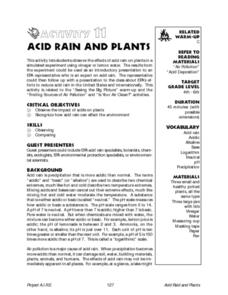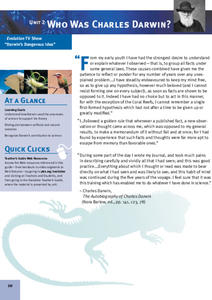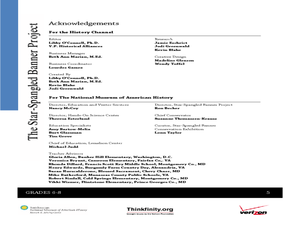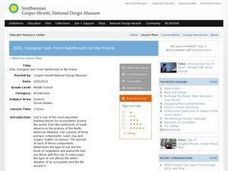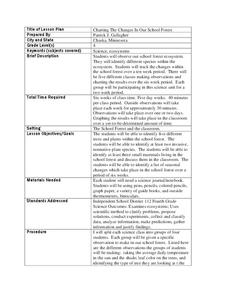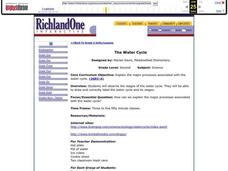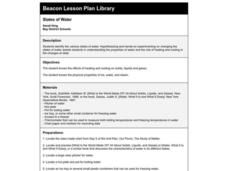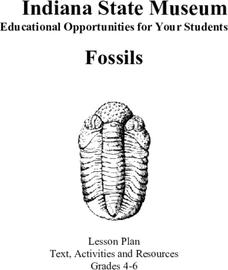Curated OER
What Turns Seeds On?
Learners design, implement, and report a scientific research project using the scientific method. They explain the experiment and its findings through poster, essay , or other presentation method.
Curated OER
Exploring the Moon
First graders complete an experiment illustrating why the moon appears to change over time using a flashlight and ball. Students discuss the shape of the moon and identify it as a sphere. Students write a short informational piece after...
Curated OER
Insulators and Conductors
Fourth graders experiment to discover which items are conductors and which items are insulators. In this insulators and conductors instructional activity, 4th graders experiment and create a T-Chart. Students are assessed on the...
Curated OER
Create Your Own Fog
Students conduct an experiment. In this science instructional activity, students create their own fog. Students observe the results.
Curated OER
Static electricity: Ah, There's the rub!
Learners experiment to investigate static electricity. In this static electricity lesson, students prepare a balloon head and draw a face on it. Learners rub the nose and the balloon moves toward the student rubbing.
Curated OER
The Colors of Chemistry
Students investigate the acidity and alkalinity of common household products in an experiment. They use red cabbage juice and litmus paper to show the difference between strong acids and bases as they work with vinegar, dish washing...
Curated OER
Acid Rain And Plants
Students observe the effects of acid rain on plants. They simulate an experiment using vinegar or lemon water. They observe the impact of acids on plants and recognize how acid rain can affect the environment. They examine their plants...
Curated OER
Oil and its Everyday Uses
Explore the properties of oil through an experiment. They use the scientific process to investigate oil, participate in experiments, watch videos,and use information from the internet to determine how oil has changed our everyday lives.
Curated OER
Who Was Charles Darwin?
Students examine how Darwin used the processes of science to support his theory. They distinguish between artificial and natural selection, recognize Darwin's contribution to science. They produce a newspaper describing the times in...
Curated OER
Earth Changes
Students explore the make-up of the earth and the changes it undergoes in an earthquake. In this earth science lesson, students have two activities as part of a unit. First, to use a Styrofoam ball to model the earth's structure, and...
Curated OER
To Protect Your Streams, Protect Your Mountains
Students build and experiment with a watershed to understand the effects of pollution. In this movement of water lesson, students work in groups creating rock formations and change the viscosity of the liquids falling down the mountain....
Curated OER
Destructive Impact of Environment on Artifacts
Students recognize that artifacts are destroyed over time. In this environmental factors on artifacts lesson, students experiment and observe through the microscope to find the environmental impact on artifacts. Students make a list of...
Curated OER
Soil, Designer Soil: From Rainforests to the Prairie
Students explore the role and importance of soil in the ecosystem. In this Science and Social Studies instructional activity, students complete an experiment using various kinds of soil and clay and then examine how soil has a direct...
Curated OER
Charting the Changes in Our School Forest
Fourth graders investigate the ecosystem and how forests are disappearing. In this environmental protection lesson, 4th graders analyze the changes in their school for 2 weeks. Students practice identifying trees, birds, and foliage...
Curated OER
The Case of Similar Substances
Students perform tests in the lab to identify an unknown substance. In this physical science lesson, students observe the physical and chemical properties of substances. They formulate a conclusion based on experimental results.
Curated OER
Coasts
Students explain the different types of marine coasts and where they are located in the United States and its territories. They explain and identify some of the life forms that inhabit different marine coastal regions.
Alabama Learning Exchange
Presenting the Water Cycle
Third graders complete a unit of study about the water cycle using both print and Internet based resources. They examine fresh and salt water and complete an online quiz before developing a multimedia presentation highlighting the phases...
Curated OER
Hello Sun, Goodnight Moon
Students become familiar with different times around the world through the reading of 9 O'clock Lullaby. In this Earth, sun, moon lesson, students recognize the movement of the Earth and the relationship to the sun and the moon. ...
Curated OER
The Water Cycle
Second graders conduct an a water cycle experiment. In this water cycle activity, 2nd graders observe a puddle of water, they predict how it got there and what will happen to it. Students watch a demonstration on the water cycle and...
Curated OER
STATES OF WATER
Students identify the various states of water. They use hypothesizing and hands-on experimenting on changing the states of water, the properties of water, and the role of heating and cooling in the changes of state.
Curated OER
Fossils
Students complete a unit on fossils. They read and discuss informational handouts, define key vocabulary terms, answer discussion questions, create a geologic timeline and a timeline of their own life, analyze bones, and create a fossil...
Curated OER
How Does Evolution Work?
Students investigate how natural selection influences evolution. They complete a hands-on lab simulation of natural selection, and replicate a real experiment and examine the interplay between selection factors in a population of guppies.
Curated OER
Seasons
Students investigate the reason for seasons on Earth during three activities. They construct a model of the Earth and Sun to identify patterns in the changes of the angle of light on the Earth's surface. Then they conduct a heat...
Alabama Learning Exchange (ALEX)
Sonar Mapping of the Ocean Floor
Eighth graders participate in an experiment that emulates a sonar signal bouncing off the ocean floor. They determine how the ocean floor is measured by the length of time it takes for the sonar signal to return. They work with a wooden...








